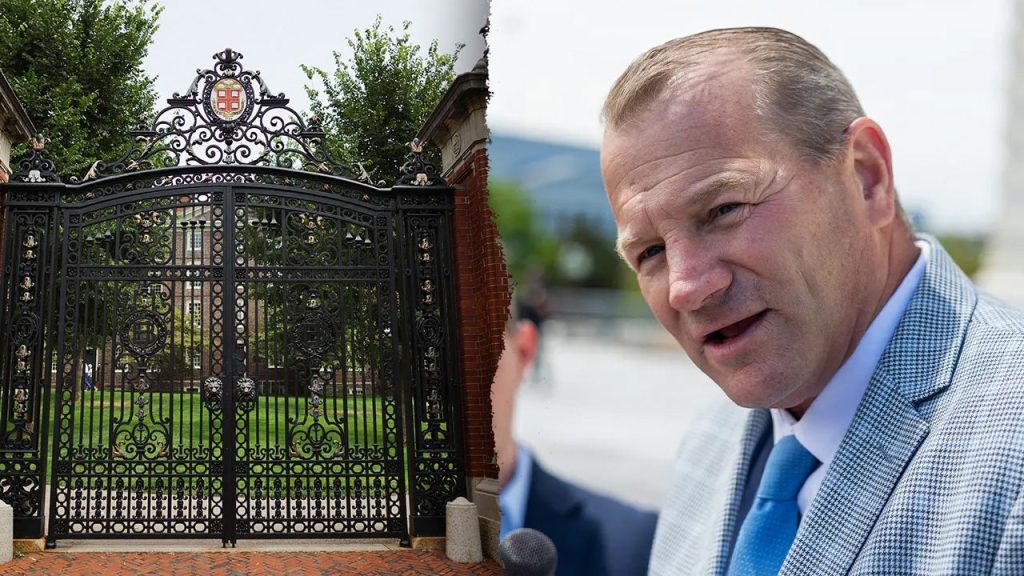A significant controversy has emerged at Brown University, drawing the attention of lawmakers in Washington. Rep. Troy Nehls from Texas has urged the institution to reconsider disciplinary actions against sophomore student Alex Shieh, who sent an email to non-faculty staff questioning their daily activities. This incident raises questions about transparency in administrative roles and the broader implications of free speech on university campuses, especially in light of rising tuition costs.
| Article Subheadings |
|---|
| 1) Background of the Incident |
| 2) Rep. Nehls’ Response |
| 3) Implications for Free Speech |
| 4) University’s Position |
| 5) Financial Context and Concerns |
Background of the Incident
The situation at Brown University began when sophomore Alex Shieh sent an email to 3,805 non-faculty staff members, explicitly asking, “What do you do all day?” This email mimicked the style of a campaign associated with Elon Musk’s Department of Government Efficiency, also referred to as DOGE. Shieh’s actions arose from his perspective as a student paying high tuition fees and his concerns regarding the efficiency of administrative operations. In response to his inquiry, Shieh was charged with misrepresentation and violating the university’s IT policy, which led to a disciplinary hearing.
Rep. Nehls’ Response
Rep. Troy Nehls took a keen interest in this unfolding situation, expressing his concerns in a letter sent to Brown University. He urged the administration to reconsider any disciplinary actions taken against Shieh. Nehls emphasized that Shieh’s inquiry represented a legitimate journalistic endeavor to grasp the administrative structure at the university. He stated,
“Penalizing a student for what appears to be an attempt to understand the university’s administrative structure raises serious questions about the institution’s commitment to open inquiry and the tolerance of dissenting viewpoints.”
His letter highlights the importance of maintaining open dialogue, especially in educational settings.
Implications for Free Speech
The incident has reignited discussions surrounding free speech on college campuses, particularly at Ivy League institutions. Observers have noted that penalizing students for their inquiries may stifle open discourse and discourage students from voicing their concerns. In his correspondence, Rep. Nehls criticized the potential suppression of free expression, urging the administration to reaffirm its commitment to transparency and the protection of students’ rights to question institutional conduct.
Nehls’ stance has resonated with various advocacy groups that promote free speech. They argue that universities, which often promote themselves as bastions of academic freedom, should uphold these principles, even when faced with challenging questions about their internal operations.
University’s Position
Brown University has responded to the controversy with some caution. The university maintains that it is not an issue of free speech, but rather concerns related to the misuse of non-public data and the ethical appropriateness of targeting specific employees. Brian Clark, vice president for news and strategic campus communications, stated in an email that the university has established procedures to investigate alleged violations of conduct codes. He remarked,
“In spite of what has been reported publicly framing this as a free speech issue, it absolutely is not.”
The university emphasized that its primary focus lies in adhering to established protocols to maintain the integrity of its operations and the privacy of its employees. They acknowledged Shieh’s actions but indicated that any investigations would be guided by the rules set forth in their conduct code.
Financial Context and Concerns
The incident comes against the backdrop of rising tuition costs, which have become a pressing concern for many current and prospective students. For the academic year 2025-26, Brown has set tuition at approximately $71,700, with overall costs—including fees and housing—amounting to nearly $96,000 annually. This substantial financial burden has put universities under scrutiny, especially as lawmakers and stakeholders question how endowment funds are used.
Rep. Nehls has also expressed interest in knowing how Brown’s $7.2 billion endowment is utilized to mitigate tuition costs. He called for more transparency regarding how these funds impact the student experience. This scrutiny is particularly relevant as American Ivy League institutions have come under increasing examination for their financial management practices and policies related to student welfare.
Key Points
| No. | Key Points |
|---|---|
| 1 | Brown University student Alex Shieh faces disciplinary action for sending an email to staff asking about their job roles. |
| 2 | Rep. Troy Nehls supports Shieh, arguing that the inquiry is a valid pursuit of transparency. |
| 3 | The university contends the issue revolves around data misuse rather than free speech. |
| 4 | Rising tuition costs have prompted calls for greater transparency in how university funds are used. |
| 5 | This incident has reignited discussions about the balance between institutional privacy and student rights. |
Summary
In summary, the unfolding situation at Brown University raises critical questions about free speech, administrative transparency, and the rising cost of education. As lawmakers like Rep. Nehls push for accountability, the university must navigate challenges surrounding its internal policies while striving to uphold its academic principles. The outcome of this controversy may have ripple effects across campuses nationwide, influencing how student inquiries are perceived and handled in the future.
Frequently Asked Questions
Question: What prompted Alex Shieh to email non-faculty employees at Brown University?
Alex Shieh sent the email in response to his concerns about rising tuition costs and wanted to understand the roles of university staff.
Question: What are the possible repercussions for Alex Shieh following his inquiry?
Shieh is facing potential disciplinary action from the university for charges related to misrepresentation and violating IT policies.
Question: How does Brown University justify its disciplinary actions?
The university maintains that the focus of the review is on the improper use of non-public data and not on issues surrounding free speech.


